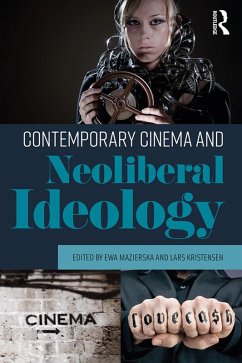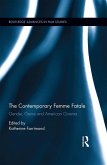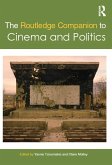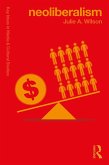Contemporary Cinema and Neoliberal Ideology (eBook, PDF)
Redaktion: Mazierska, Ewa; Kristensen, Lars
38,95 €
38,95 €
inkl. MwSt.
Sofort per Download lieferbar

19 °P sammeln
38,95 €
Als Download kaufen

38,95 €
inkl. MwSt.
Sofort per Download lieferbar

19 °P sammeln
Jetzt verschenken
Alle Infos zum eBook verschenken
38,95 €
inkl. MwSt.
Sofort per Download lieferbar
Alle Infos zum eBook verschenken

19 °P sammeln
Contemporary Cinema and Neoliberal Ideology (eBook, PDF)
Redaktion: Mazierska, Ewa; Kristensen, Lars
- Format: PDF
- Merkliste
- Auf die Merkliste
- Bewerten Bewerten
- Teilen
- Produkt teilen
- Produkterinnerung
- Produkterinnerung

Bitte loggen Sie sich zunächst in Ihr Kundenkonto ein oder registrieren Sie sich bei
bücher.de, um das eBook-Abo tolino select nutzen zu können.
Hier können Sie sich einloggen
Hier können Sie sich einloggen
Sie sind bereits eingeloggt. Klicken Sie auf 2. tolino select Abo, um fortzufahren.

Bitte loggen Sie sich zunächst in Ihr Kundenkonto ein oder registrieren Sie sich bei bücher.de, um das eBook-Abo tolino select nutzen zu können.
In this edited collection, an international ensemble of scholars examine what contemporary cinema tells us about neoliberal capitalism and cinema, exploring whether filmmakers are able to imagine progressive alternatives under capitalist conditions.
- Geräte: PC
- mit Kopierschutz
- eBook Hilfe
- Größe: 23.95MB
Andere Kunden interessierten sich auch für
![Love in Contemporary Cinema (eBook, PDF) Love in Contemporary Cinema (eBook, PDF)]() Benjamín de la Pava VélezLove in Contemporary Cinema (eBook, PDF)41,95 €
Benjamín de la Pava VélezLove in Contemporary Cinema (eBook, PDF)41,95 €![The Other in Contemporary Migrant Cinema (eBook, PDF) The Other in Contemporary Migrant Cinema (eBook, PDF)]() Guido RingsThe Other in Contemporary Migrant Cinema (eBook, PDF)44,95 €
Guido RingsThe Other in Contemporary Migrant Cinema (eBook, PDF)44,95 €![The Contemporary Femme Fatale (eBook, PDF) The Contemporary Femme Fatale (eBook, PDF)]() Katherine FarrimondThe Contemporary Femme Fatale (eBook, PDF)40,95 €
Katherine FarrimondThe Contemporary Femme Fatale (eBook, PDF)40,95 €![Television Culture (eBook, PDF) Television Culture (eBook, PDF)]() John FiskeTelevision Culture (eBook, PDF)36,95 €
John FiskeTelevision Culture (eBook, PDF)36,95 €![The Routledge Companion to Cinema and Politics (eBook, PDF) The Routledge Companion to Cinema and Politics (eBook, PDF)]() The Routledge Companion to Cinema and Politics (eBook, PDF)48,95 €
The Routledge Companion to Cinema and Politics (eBook, PDF)48,95 €![Foundations of Critical Theory (eBook, PDF) Foundations of Critical Theory (eBook, PDF)]() Christian FuchsFoundations of Critical Theory (eBook, PDF)33,95 €
Christian FuchsFoundations of Critical Theory (eBook, PDF)33,95 €![Neoliberalism (eBook, PDF) Neoliberalism (eBook, PDF)]() Julie WilsonNeoliberalism (eBook, PDF)30,95 €
Julie WilsonNeoliberalism (eBook, PDF)30,95 €-
-
-
In this edited collection, an international ensemble of scholars examine what contemporary cinema tells us about neoliberal capitalism and cinema, exploring whether filmmakers are able to imagine progressive alternatives under capitalist conditions.
Dieser Download kann aus rechtlichen Gründen nur mit Rechnungsadresse in A, B, BG, CY, CZ, D, DK, EW, E, FIN, F, GR, HR, H, IRL, I, LT, L, LR, M, NL, PL, P, R, S, SLO, SK ausgeliefert werden.
Produktdetails
- Produktdetails
- Verlag: Taylor & Francis eBooks
- Seitenzahl: 264
- Erscheinungstermin: 22. September 2017
- Englisch
- ISBN-13: 9781315304069
- Artikelnr.: 49272517
- Verlag: Taylor & Francis eBooks
- Seitenzahl: 264
- Erscheinungstermin: 22. September 2017
- Englisch
- ISBN-13: 9781315304069
- Artikelnr.: 49272517
- Herstellerkennzeichnung Die Herstellerinformationen sind derzeit nicht verfügbar.
Ewa Mazierska is Professor of Film Studies at the School of Humanities and Social Sciences at the University of Central Lancashire. She published over twenty monographs and edited collections on film and popular music. Mazierska (with Kristensen) has also organised two conferences entitled 'Marx at the Movies', once in 2012 and again in 2015, which were devoted to the interface between the moving image and Marxism. Lars Kristensen is Senior Lecturer in Media Arts, Aesthetics and Narration at the University of Skövde, Sweden, where he teaches moving image theory to game developers. His research focuses on Russian and Eastern European filmmaking as well as bicycle cinema, post-critique and theories of game and play. His publications have appeared in Studies in Eastern European Cinema, Games and Culture, Journal of Gaming and Virtual Worlds and Thesis Eleven.
Introduction
Part I: Contemporary modes of production
1. Socialist Filmmaking or a Question of Leadership?: The working methods
of Ken Loach
David Archibald (University of Glasgow)
2. American Independent Cinema and the Capitalist Mode of Production:
Complicating Narratives of Subversion and Transgression
Kevan A. Feshami (University of Colorado Boulder)
3. Crowdfunded, or just crowded? The independent film market in the age of
the Internet.
William Brown (University of Roehampton)
4. Mode of Production as a Political Statement: Veiko Õunpuu's Films and
Methods
Eva Näripea (Estonian Academy of Arts)
5. When Cinephilia Returned to Russia: Marxist cinema responds to
Neo-liberal Capitalism.
Lars Kristensen (University of Skövde)
6. Uncranking the System: Ceicine and the Case of Adirley Queirós's White
Out, Black Stay (2014)
Alfredo Suppia (State University of Campinas)
Part II: Class relations, crisis and debt
7. Joanna Hogg: Bourgeois Social Realism and the Enduring Significance of
Capitalism and Class
Paul Dave (University of Teesside)
8. The Rise of the Entrepreneur: Jia Zhangke's Words of a Journey
Corey K.N. Schultz (University of Southampton)
9. The representation of class in recent Greek cinema
Rosa Barotsi (ICI Berlin)
10. Neoliberal Crisis, Debt and European Cinema
Ewa Mazierska (University of Central Lancashire)
11. Representation of Class Struggle in Contemporary American Cinema, or
'Socialism for Dummies'
Doru Pop (Babe¿-Bolyai University, Cluj)
Part III: Capitalism, Love and Sex
12. 'Boy-Image Meets Girl-Image and Consummates Image-Romance': Shulamith
Firestone's "The Dialectic of Sex, The Cultural Contradictions of
Capitalism and Romantic Comedies.
Anna Backman Rogers (University of Gothenburg)
13. Love can save the day: charting two decades of love and sex within
capitalism as seen through the cinematic lens of Bret Easton Ellis
Kamila Rymajdo (Kingston University)
14. Queering Bakhtin: Sexual Carnival and Class Struggle in Eytan Fox's
The Bubble
Bruce Williams (William Paterson University of New Jersey)
Part I: Contemporary modes of production
1. Socialist Filmmaking or a Question of Leadership?: The working methods
of Ken Loach
David Archibald (University of Glasgow)
2. American Independent Cinema and the Capitalist Mode of Production:
Complicating Narratives of Subversion and Transgression
Kevan A. Feshami (University of Colorado Boulder)
3. Crowdfunded, or just crowded? The independent film market in the age of
the Internet.
William Brown (University of Roehampton)
4. Mode of Production as a Political Statement: Veiko Õunpuu's Films and
Methods
Eva Näripea (Estonian Academy of Arts)
5. When Cinephilia Returned to Russia: Marxist cinema responds to
Neo-liberal Capitalism.
Lars Kristensen (University of Skövde)
6. Uncranking the System: Ceicine and the Case of Adirley Queirós's White
Out, Black Stay (2014)
Alfredo Suppia (State University of Campinas)
Part II: Class relations, crisis and debt
7. Joanna Hogg: Bourgeois Social Realism and the Enduring Significance of
Capitalism and Class
Paul Dave (University of Teesside)
8. The Rise of the Entrepreneur: Jia Zhangke's Words of a Journey
Corey K.N. Schultz (University of Southampton)
9. The representation of class in recent Greek cinema
Rosa Barotsi (ICI Berlin)
10. Neoliberal Crisis, Debt and European Cinema
Ewa Mazierska (University of Central Lancashire)
11. Representation of Class Struggle in Contemporary American Cinema, or
'Socialism for Dummies'
Doru Pop (Babe¿-Bolyai University, Cluj)
Part III: Capitalism, Love and Sex
12. 'Boy-Image Meets Girl-Image and Consummates Image-Romance': Shulamith
Firestone's "The Dialectic of Sex, The Cultural Contradictions of
Capitalism and Romantic Comedies.
Anna Backman Rogers (University of Gothenburg)
13. Love can save the day: charting two decades of love and sex within
capitalism as seen through the cinematic lens of Bret Easton Ellis
Kamila Rymajdo (Kingston University)
14. Queering Bakhtin: Sexual Carnival and Class Struggle in Eytan Fox's
The Bubble
Bruce Williams (William Paterson University of New Jersey)
Introduction
Part I: Contemporary modes of production
1. Socialist Filmmaking or a Question of Leadership?: The working methods
of Ken Loach
David Archibald (University of Glasgow)
2. American Independent Cinema and the Capitalist Mode of Production:
Complicating Narratives of Subversion and Transgression
Kevan A. Feshami (University of Colorado Boulder)
3. Crowdfunded, or just crowded? The independent film market in the age of
the Internet.
William Brown (University of Roehampton)
4. Mode of Production as a Political Statement: Veiko Õunpuu's Films and
Methods
Eva Näripea (Estonian Academy of Arts)
5. When Cinephilia Returned to Russia: Marxist cinema responds to
Neo-liberal Capitalism.
Lars Kristensen (University of Skövde)
6. Uncranking the System: Ceicine and the Case of Adirley Queirós's White
Out, Black Stay (2014)
Alfredo Suppia (State University of Campinas)
Part II: Class relations, crisis and debt
7. Joanna Hogg: Bourgeois Social Realism and the Enduring Significance of
Capitalism and Class
Paul Dave (University of Teesside)
8. The Rise of the Entrepreneur: Jia Zhangke's Words of a Journey
Corey K.N. Schultz (University of Southampton)
9. The representation of class in recent Greek cinema
Rosa Barotsi (ICI Berlin)
10. Neoliberal Crisis, Debt and European Cinema
Ewa Mazierska (University of Central Lancashire)
11. Representation of Class Struggle in Contemporary American Cinema, or
'Socialism for Dummies'
Doru Pop (Babe¿-Bolyai University, Cluj)
Part III: Capitalism, Love and Sex
12. 'Boy-Image Meets Girl-Image and Consummates Image-Romance': Shulamith
Firestone's "The Dialectic of Sex, The Cultural Contradictions of
Capitalism and Romantic Comedies.
Anna Backman Rogers (University of Gothenburg)
13. Love can save the day: charting two decades of love and sex within
capitalism as seen through the cinematic lens of Bret Easton Ellis
Kamila Rymajdo (Kingston University)
14. Queering Bakhtin: Sexual Carnival and Class Struggle in Eytan Fox's
The Bubble
Bruce Williams (William Paterson University of New Jersey)
Part I: Contemporary modes of production
1. Socialist Filmmaking or a Question of Leadership?: The working methods
of Ken Loach
David Archibald (University of Glasgow)
2. American Independent Cinema and the Capitalist Mode of Production:
Complicating Narratives of Subversion and Transgression
Kevan A. Feshami (University of Colorado Boulder)
3. Crowdfunded, or just crowded? The independent film market in the age of
the Internet.
William Brown (University of Roehampton)
4. Mode of Production as a Political Statement: Veiko Õunpuu's Films and
Methods
Eva Näripea (Estonian Academy of Arts)
5. When Cinephilia Returned to Russia: Marxist cinema responds to
Neo-liberal Capitalism.
Lars Kristensen (University of Skövde)
6. Uncranking the System: Ceicine and the Case of Adirley Queirós's White
Out, Black Stay (2014)
Alfredo Suppia (State University of Campinas)
Part II: Class relations, crisis and debt
7. Joanna Hogg: Bourgeois Social Realism and the Enduring Significance of
Capitalism and Class
Paul Dave (University of Teesside)
8. The Rise of the Entrepreneur: Jia Zhangke's Words of a Journey
Corey K.N. Schultz (University of Southampton)
9. The representation of class in recent Greek cinema
Rosa Barotsi (ICI Berlin)
10. Neoliberal Crisis, Debt and European Cinema
Ewa Mazierska (University of Central Lancashire)
11. Representation of Class Struggle in Contemporary American Cinema, or
'Socialism for Dummies'
Doru Pop (Babe¿-Bolyai University, Cluj)
Part III: Capitalism, Love and Sex
12. 'Boy-Image Meets Girl-Image and Consummates Image-Romance': Shulamith
Firestone's "The Dialectic of Sex, The Cultural Contradictions of
Capitalism and Romantic Comedies.
Anna Backman Rogers (University of Gothenburg)
13. Love can save the day: charting two decades of love and sex within
capitalism as seen through the cinematic lens of Bret Easton Ellis
Kamila Rymajdo (Kingston University)
14. Queering Bakhtin: Sexual Carnival and Class Struggle in Eytan Fox's
The Bubble
Bruce Williams (William Paterson University of New Jersey)







